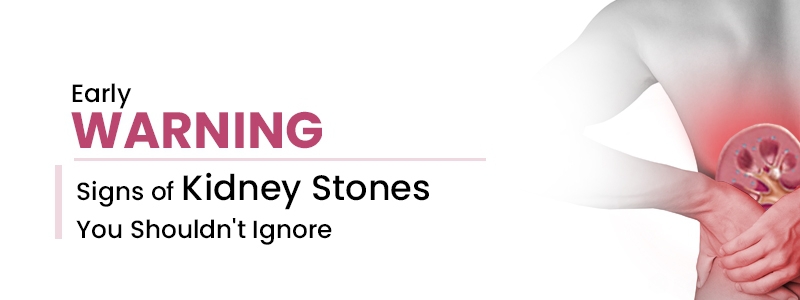Early Warning Signs of Kidney Stones that You Shouldn't Ignore
2019-05-28 / RG STONE HOSPITAL / Urinary / Kidney Stone

People who have had kidney stones say that pain can be excruciating. Preventing kidney stones means making certain changes to your lifestyle – primarily drinking lots of water. But first, let us understand what kidney stones are.
Kidney Stones :
Minerals and salts get collected inside your kidneys and travel down the urinary tract in the urine. When the level of these chemicals rise above the normal limit, they crystallize and form kidney stones, which can get stuck in the tract and cause infection or other complications.
Kidney stones vary in size and range from very small to even as large as a few inches wide. You may not immediately find out that you have a kidney stone. You can,however, check for some early symptoms.
Early Warning Signs of Kidney Stones :
Here are some of the symptoms that you might notice if you have a kidney stone:
- Stomach, Back, or Side Pain – This pain can be so bad that it has even been compared to labour pain. It usually starts when the stone moves into the ureter, causing a blockage and putting pressure on the kidney. The pain can start all of a sudden and differ in intensity or location,and it comes in waves that can last for minutes. The pain in the back tends to spread.
- Pain During Urinating / Frequency of Urine – Once the stone reaches the crossing point of the bladder and the ureter, it causes pain during urination. This pain is often a sharp and burning sensation. This pain is sometimes confused with urinary tract infection. A major sign of having a kidney stone is irregular urination.
- Blood in Urine – Pink, brown or red blood in your urine can be another sign of kidney stone. The blood cells might sometimes be too small for you to notice in your urine. Your doctor can run tests to check for this issue.
- Cloudy and Foul Smelling Urine – If your urine smells bad, it can be a sign of infection in the kidneys or urinary tract. The presence of pus in urine makes it cloudy.
- Bladder not Emptied Properly – Kidney stones can cause blockage that stops or slows down the flow of urine. If you are unable to urinate, you need to get medical help immediately.
- Nausea or Vomiting – The kidneys and gastrointestinal tract have some common nerve connections which can be triggered by kidney stones, causing nausea.
- Fever or Chills – This is a sign of infection in the kidneys or urinary tract. If you have fever or have any pain, contact your doctor. The fever is usually high, accompanied by chills and rigor.
Variation in Symptoms :
The symptoms can vary according to age and gender because the urinary tract is different.
- Men – Men usually experience pain in the abdomen or groin or lower back along with some gastric discomfort.
- Women – Women have pain or itching sensation in the vulva, discharge or menstrual pain like symptoms too.
- Children – Children might be restless, have changed urine color or frequency, and blood in urine.
Treatment for Kidney Stones :
You can get a kidney stone treated in different ways, and the size of the stone determines the type of treatment. Small stones can pass on their own through urine, with the help of a lot of fluids and medicines to manage the pain. Antibiotics can be used to treat infection; or drugs can help in relaxing the ureter to make the stone pass more quickly.
Larger stones that cannot pass on their own can be treated by different procedures like lithotripsy or ureteroscopy.
Conclusion
Kidney stones are painful and uncomfortable and if you notice any of the early symptoms you should get yourself checked out. Kidney stones can be prevented. If you are prone to getting kidney stones, you must ensure that you stay hydrated so that the minerals in your urine do not form stones.
By RG Hospital
Read more About : Kidney Stone Treatment & Procedure
Consult Kidney Stone Specialist
Categories
Hernia Repair
Appendicitis
Piles
Urological Treatment
Hernia treatment
Enlarged Prostate (BPH)
Gall Bladder Stone
Urinary / Kidney Stone
Vitamins
Indian Health Care System
Exercise
Obesity
Female Urinary Incontinence
Single Incision Laparoscopic Surgery (SILS)
Kidney Cancer
Bladder Cancer
Ovarian cancer
Nephrology
Bariatric Surgery
Kidney Function Test
Female Urology
Radiation Therapy
Alcoholic Fatty Liver
Liver disease
Gastroenterology
Kidney Disease

